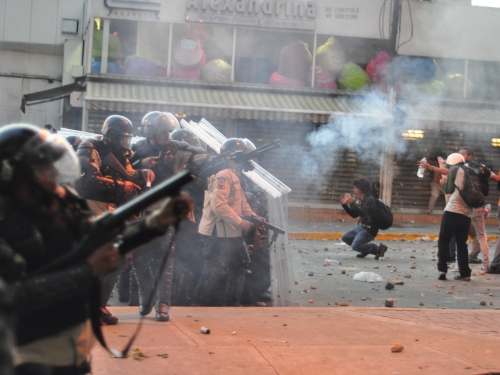
This article was originally published by Southern Pulse on 22 January 2015.
On 14 January 2014, Venezuelan President Nicolas Maduro promised the Petrocaribe alliance would continue and its twenty member countries would further consolidate into a “great economic zone.” President Maduro’s guarantee comes at a precarious time for his country, as a rapid and unexpected slump in global oil prices, coupled with persistent economic stagnation in Venezuela, have undercut his administration’s ability to maintain its social programs and address the country’s financial imbalances.
Venezuelan oil closed the second week of January at US$42.44 per barrel, the lowest price in more than five years. The Venezuelan government needs a price of US$117 per barrel to balance its 2015 budget, according to Deutsche Bank. In spite of the price slide, Venezuela has not cut provisions to Petrocaribe members, delivering 206,000 barrels per day as recently as September 2014. In recent days, the Venezuelan government experienced a downgrade of its bonds by Moody’s from Caa1 to Caa3 and a lowered issuer rating for state oil company Pdvsa, from Caa1 to Caa3. The drop in the price of oil, which supplies as much as 96 percent of the Venezuelan government’s foreign currency, and the country’s diminished status in international lending markets prompted President Maduro to venture abroad for more financial aid.
President Maduro was scheduled to give an address before the National Assembly on 15 January, but extended a tour that began on 4 January and which took him to China, Iran, Saudi Arabia and Qatar. In his absence, shortages of basic consumer goods came to the fore in Venezuela, exacerbated by a holiday slowdown in deliveries. Throughout Caracas and across the country, residents lined up outside stores to get some of the limited supplies of heavily rationed goods. Members of the country’s national guard monitored the shoppers.
Limited supplies of goods colored public perceptions of government policies. According to Luis Vicente León, director of the survey firm Datanálisis, by December 2014, 73 percent of Venezuelans did not trust the government’s strategy of supervising production to improve shortages. Moreover, 85 percent of respondents reject expropriations as a mechanism to resolve the crisis. Leon said that 93 percent of Venezuelans – including many chavistas – believe that companies taken over by the government produce less than they did as private entities.
Widespread public dissatisfaction with the economic climate lent credence to unconfirmed reports this week that members of the military leadership and of government-aligned, and often armed, groups known as colectivos might try to prevent President Maduro from assuming office upon his return.
While the military has traditionally been a bastion of support for the Venezuelan government, the country’s deteriorating economic and political situation could exacerbate divides between factions within the armed forces. Further, the targeting of one colectivo by Caracas police in October 2014 showed that the government will act against ostensible allies should their loyalty fall into question. Fernando Ochoa Antich, who was defense minister during late President Hugo Chavez’s coup attempt in 1992, called a coup possible, but doubted that chavista factions, either civilian and military, were plotting to replace President Maduro, given that it would deepen the current political tensions.
President Maduro asserts that his trip secured sufficient resources, including US$20 billion in financing from China, to maintain “the rhythm of investment, of importation, [and] economic stability.” President Maduro also reported agreements worth billions of dollars from Qatar, which sources confirmed is considering investments in Venezuela’s energy, property, and tourism sectors. He added after a meeting with Russian Premier Vladimir Putin that Venezuela would work with OPEC and non-OPEC-member countries to return global oil prices to a normal level of around US$100 a barrel. This assertion comes despite statements by Saudi Arabia and others that they do not intend to lower output to reverse the decline in prices.
Plummeting global oil prices combined with Venezuela’s protracted economic and political tumult have further strained the Maduro administration ahead of a December parliamentary election that is already being cast as a referendum on his government. Despite internal calls to reevaluate external fuel subsidies and a decreased ability to meet those obligations, President Maduro is unlikely to make any dramatic change to Petrocaribe shipments, as oil deliveries are critical to maintaining regional support for his government. Yet the strong economic pressure could help bring to fruition the coup d’état that the Maduro government has warned about in the past.
* The views expressed in blog posts are those of the authors and do not necessarily represent Southern Pulse as an organization.
Chris Woody is the Managing Editor of Southern Pulse.
For more information on issues and events that shape our world, please visit ISN Security Watch or browse our resources.

